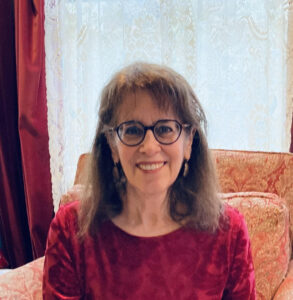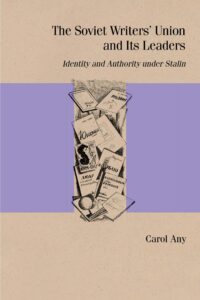Faculty Spotlight – Russian
 |
Carol AnyAssociate Professor |
My path to becoming a professor started during college, when I spent a summer studying in Russia. In Leningrad (now St. Petersburg), I fell in love with a city, a people, and a culture. My new book on literary life under Stalin has its roots in that first exposure to a country where I was very much the “other,” but felt a deep connection to my new Russian friends. My curiosity about them became a quest to understand what had shaped them. Eventually, it led me into archives where I read diaries, letters, and other documents that reveal the secrets of a bygone era that still casts a long shadow over how Russians live today.
 In my book, The Soviet Writers’ Union and Its Leaders: Identity and Authority under Stalin, I investigate the dilemmas faced by Russian writers living under a personality cult. How did proud communist writers preserve their self-concept once their early ideals were perverted by a bloody dictator? How did non-communist writers assert their dignity in a political system that measured people’s worth by their commitment to communism? I came to recognize the anguished choices of these writers as universal human strategies for coping with threats to personal autonomy. An unexpected result of this research was that I wound up developing a course on personal identity. Our responses to authority—benign or malign—are crucial to how we form our sense of self.
In my book, The Soviet Writers’ Union and Its Leaders: Identity and Authority under Stalin, I investigate the dilemmas faced by Russian writers living under a personality cult. How did proud communist writers preserve their self-concept once their early ideals were perverted by a bloody dictator? How did non-communist writers assert their dignity in a political system that measured people’s worth by their commitment to communism? I came to recognize the anguished choices of these writers as universal human strategies for coping with threats to personal autonomy. An unexpected result of this research was that I wound up developing a course on personal identity. Our responses to authority—benign or malign—are crucial to how we form our sense of self.
It’s been said that “the Russian soul encompasses everything.” There’s nothing I enjoy more than opening that expansive, passionate world to my students and exploring it with them.
